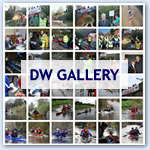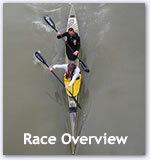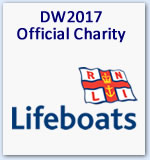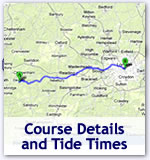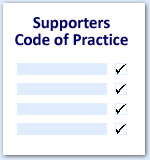Maidstone Novice Veterans Up for DW2014
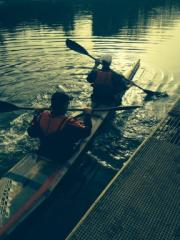 Two novice veterans from Maidstone are taking on the DW challenge in 2014. Novice in their case means just that. In August 2013 neither Bryn Price or Paul Curtis had ever raced a canoe. The idea was planted by the Kent People's Trust administrator who asked Bryn, the Trust Director and Paul the Honorary Treasurer what silly thing they are going to do next. A visit to Maidstone Canoe Club in August was met with support and trials in a range of boats. They soon became proficient at falling out of even the most stable boats. First race was the Elmbridge Hasler and true to format they fell out in front of the Clubhouse. These two novices do not give up, so they drained the boat and got underway, winning the Div 9 race and beating all the Div 8s.
Two novice veterans from Maidstone are taking on the DW challenge in 2014. Novice in their case means just that. In August 2013 neither Bryn Price or Paul Curtis had ever raced a canoe. The idea was planted by the Kent People's Trust administrator who asked Bryn, the Trust Director and Paul the Honorary Treasurer what silly thing they are going to do next. A visit to Maidstone Canoe Club in August was met with support and trials in a range of boats. They soon became proficient at falling out of even the most stable boats. First race was the Elmbridge Hasler and true to format they fell out in front of the Clubhouse. These two novices do not give up, so they drained the boat and got underway, winning the Div 9 race and beating all the Div 8s.
Winter training on the Medway has been a serious challenge as it has been in flood from Xmas through to Febuary, so long drives to the London canals and the Military canal have taken up the weekends.
Waterside C was a good chance to get an idea on how fast they are and how tough it is to get in and out when age has robbed you of your flexibility.
Bryn and Paul are looking forward to seeing county Hall on Easter Sunday but the challenge of the Thames at 3am hangs over this pair of committed veteran novices, so if you see them on the route give them a cheer.
RACE REPORT
A quick update on our DW. We were going well until just before Dreadnought, when we had to slow down as Paul's right arm was giving problems. After Reading I managed to smack my left arm against a post when coming into a portage in the dark. Tried to tough it out but by Hurley was having difficulty maintaining grip. Time was then running out for us making the tide and we decided to retire.
Lessons learned include how wonderfully it was to have such a good team of 2nd's, and how difficult it is to navigate at race pace in the dark.
I will return - Bryn
Ray Rowe - Senior Singles - 2005
I just want to relate briefly my experience in the 2005 DW. I had done the race twice before, first in 1984, and again in 2003. Both times were in Senior K2. The relatively recent introduction of the K1 event has always held a mysterious allure for me - something to do with the feeling of self reliance, the sense of adventure attached to the solo experience. A couple of things put me off - firstly, the impression of a four day race with some sort of camping/sleeping in church halls just didn't feel attractive (so much for the adventurous spirit!). Secondly I live in N. Ireland - how could I expect anyone to give up all the time involved in travelling to the race and then hanging around four days? And yet I could not rid myself of the hankering to thrash across England in a K1.
Before Christmas I did a few long paddles to see just how long I could sit in the boat before my screaming rear-end forced me off the seat. About an hour - not good! The bum ache would have to be worked on but just how feasible was my plan to take on the race without support (possibly in some kind of expedition spirit, with the necessary food and gear on board)? I was prepared to give this a try and so, by way of research, I phoned Paul Ralph of Marsport, whose opinion on all things DW I have come to trust implicitly. Could a guy arrive at Devizes, park up and just head down the course for four days - no support crew? Would it break any race rules? Thinking the worst of how he might view my Email, I tried to reassure him that I was not a nutter. My fears were completely ill-founded and, on the contrary, Paul's enthusiastic and very encouraging response well and truly sealed the idea for me. Thank you God for giving us people like Paul, who see the positive side, who love their sport and can look beyond their own egos to encourage others. This "definitely doable" confirmation was what I needed to start me preparing seriously for the race. It was to be an early Easter so time was limited.
Within a few weeks I had announced the crazy plan to my paddling mates. I'd never previously mentioned this to them and they were a little surprised at first. Lesser mortals would have given it, "C'mon Ray, you're 52, you've got a good TV,�why don't you get a nice mug of cocoa and CHILL - well, sit in front of the fire." Not these guys. They went away in a little huddle and two days later were back. "We're gonna support you on the Race." I had dreaded this - they were offering to give up every single day of their Easter hols for a driving and isotonic drink-mixing experience on the busy roads of Southern England. No amount of pleading on my part could dissuade them - this was Three Musketeers stuff, and I was genuinely touched. Having a totally dependable support crew meant I could stop working out where in the K1 I would store sleeping bag, bivibag and spare clothes. This would be a proper race, and I'm not talking Captain Scott to the South Pole stuff.
Well, the weather was great. There were lots of happy juniors in K2s for company. The tunnel was trickier than it is in a K2. The paddling was hard and the portages, with an 8kg boat were no big deal. Lots of really great people who hadn't a clue who I was, encouraged me from the tow path and kept asking if I needed anything. My support crew were absolutely brilliant, and being passed by seriously fast paddlers like Morley and Hendron was inspiring, and not in the least depressing.
This was my first real experience of multi-day racing and while I'm not a newcomer to the mileage I did find the hard paddling on consecutive days tough going. I was, however, amazed to discover that my overnight recovery was pretty good (using guest houses rather than a tent). Maintaining high carbo intake throughout the period was crucial. - I did have one really bad spell on the second day but I'm certain it was created by a lapse in my feeding regime.
Coming through the tideway in darkness and half light was very intimidating for me, especially as I was using a Scorpion K1 that I was relatively new to. I was fortunate to be hooked into a small group of K1s who knew the area and were moving really well. They were no doubt convinced I was a low-life parasite, sponging off their wash and unwilling to take the lead. In truth I was gripped by the sheer vastness of the Thames, combined with my lack of confidence in the Scorpion. Anyway, Westminster arrived with the river still in full ebb and me still in the boat.
This was an amazing experience and quite different to that of the doubles race. Respect to the organisers for their efficiency and dedication. Respect to Paul Ralph of Marsport for his encouragment. Respect to the Sean Morleys of this world for their serious speed over the water. And mega respect to my mates for their support in so many ways.
Jan Carpenter - Senior Doubles in a Klepper - 2007
In keeping with the DW roots, the idea to take part in the longest non-stop canoe race in the world, materialised in a pub, in Prague. I’d never heard of the race until this moment.
However, when I arrived back home, training and arrangements started in earnest.
Four ex-servicemen, all without a canoe and only one with experience in canoeing. Three of us enrolled on a BCU recognised 1 and 2 star kayak/canoe course to get a feel of what skills we would need, we had to start somewhere!
The idea from the start was to complete the race in Klepper canoes, the same kind that were used by the Commando’s during WW2 (and incidentally still used today). All we needed was to get a feel of keeping a canoe going in a straight line and how to paddle efficiently, the rest would be hard work and determination.
All training started at the end of August 2006 and it soon became evident that a serious amount of paddling was needed to achieve the required standard of fitness to even complete just one of the ‘Waterside’ series of races. These are seen as the classic warm up races before the main race and are invaluable.
After reading the website, in particular ‘DW tales’, various publications and consulted with race officials, it was decided that we would have to complete the Waterside D (34.5 miles) as part of the waterside series of races, in Kleppers, in good time, to qualify.
Our constraints at home in the mean time were to prove challenges in themselves. We were a fair distance away from the race circuit or suitable canals to train on. Training schedules, juggling work, family life (two of the teams ladies were pregnant!) and tidal constraints on the river, all played their part. We had acquired one man canoes for training in after work and at weekends, all tidal dependant. 0630 on a Sunday morning on the water was not uncommon, winter in the UK is a wonderful time of the year. The most we could do before we lost too much water was about 14 miles, against the tide as it flowed and against the tide as it ebbed when we turned about and paddled home.
For the times when there wasn’t enough water, it was running, cycling, or cardio-vascular circuits.
After a week off at Christmas, we started to put our heads together to sort out the paperwork, support crew, and the small matter of obtaining two serviceable Klepper canoes before the Waterside D race. We all had our separate jobs, mine was to source and borrow the canoes for as long as possible. After a few phone calls we managed to get three, one for spares! A morning of instruction of how to put them together and collapse them, we were well on our way, or so it seemed ...
Unfortunately, in close succession, one of the support crew and one of the canoeists had to pull out at the 11th hour due to a training injury. Morale was low. We were only a month away from the Waterside D!
It seemed that we needed a paddle fit lad who was up to scratch for the 34.5 miler within 1 month! Then the DW proper! The very man was waiting in the wings, who was duly cajoled into entering the worlds longest non-stop canoe race (which he didn’t realise was 125 miles until after he had entered!)
We trained with the Kleppers, practising portage techniques and running distances to simulate the 77 lock gates we had to negotiate. Padding out our individual seats and back rests to suit our needs for 30 hours + of paddling. The first time we tried out the new padding, we were top heavy with too much air in the buoyancy tubes, turning turtle at 0600 on a bleak Sunday morning in February. Cup of tea time.
The Waterside D was not treated as a race, more of a full dress rehearsal, the boat at its full weight carrying all kit needed. The idea was to complete/qualify in the best possible time. From this we could get an estimation of the expected total time taken to paddle Devizes to Westminster. Also, the race being from Devizes to Newbury gave us invaluable experience on part of the course. We completed this in 8 hours and 55 mins.
The two weeks between the D race and the DW was spent recovering and fine tuning the boats. We worked out our estimated timings, allowing for fudge factor, including portages, food stops and compulsory clothing changes. It was worked out it would take us 31.5 hours at 4mph to paddle non stop from Devizes to Westminster! Lots of carbohydrates, a small amount of paddling and circuit training, as well as last minute preparations took place concurrently. The day before the race we found out that our entry forms, complete with payment, had not arrived at DW HQ! I had four days physical and mental rest before the start of DW 2007.
We were constructing the canoes on Devizes wharf by 1200 on Saturday 7th April. Our kit was inspected and we had registered in the race by 1400. We had time to take onboard a bag of fish and chips and plenty of water before our scheduled 1500 start. The weather was warm and forecast getting warmer. Both Kleppers were in the water and over the start line at 15:01.
With 125 miles ahead of us and blue sky’s overhead, we were just happy to get this far after all the calamities that had befell us during training and preparation. As we were not race canoes, we treated the whole event as a test of endurance as well as achieving the best possible time.
The support crew was fantastic, we were all DW virgins. We certainly could not have reached Westminster without the support we received. 2 litres of water mixed with glucose powder and bags of chocolate mixed with raisins and biscuits was handed to us every 10 to 12 miles! Not to mention tubs of tuna and pasta at food stops. As far as I’m concerned, the whole team were as much a part of crossing the finish line as those that actually paddled across it.
During the race, problems came and went, but the main thing was to knuckle under and get the job done. Grit, determination and teamwork was the order of the day. Our boat made Teddington Lock with 15 minutes to spare before teams were stopped going through. (Special thanks to Glen). Our support failed to reach us in time after having to wait for and replenish the team behind. We had to carry on. 3 chunks of chocolate each and 1 litre of water between us for the last 17 miles.
We arrived at Westminster Bridge at 11:30 on a Sunday night absolutely shattered, to be greeted with a medal draped unceremoniously around our necks, a double egg banjo and a cup of Rosie Lea! It was a great feeling to see 4 men struggling with our canoe as we sipped on our tea! We were delirious after 32 hours 14 mins and 27 secs of paddling. We were 78th out of 86 finishing and 117 starting.
Sadly, our second crew didn’t make the tide at Teddington and decided to retire after 108 gruelling miles. They are back in training for next year, my boat team is support crew this time!
The advice I would give to anybody entering the DW for the first time, is to allow yourself plenty of time for an extensive training program. DO NOT under estimate this race. If possible, then enter all four of the Waterside series of races to get to know the course and portages. However, the D is the most important in my opinion, to gain knowledge of the start of the course and to be able to gauge your estimated timings for the whole race.
Good luck, it's well worth the effort.
Erika Henson and Camilla Lennon - Senior Doubles - 2008
Erika Henson and Camilla Lennon might seem unassuming ladies if you passed them in the street. They are neither tall nor muscle-bound. However underneath they have a steely determination that they demonstrated at the weekend when they paddled for just under 30 hours non stop in their K2. The weather was atrocious and never above freezing, with wind chill it was often minus seven. They braved freezing blizzards and winds to finish the 125 miles just as Big Ben struck 10 on Sunday night.
It was an exceedingly tough race with half the competitors retiring, it is the longest non-stop canoe race in the world. In addition the Thames was very fast moving but the girls never tipped in. However after one of the 77 portages round a lock, by a weir, there was a strong current at the put-in and the girls found themselves pinned to a tree, but with their calm approach and excellent seamanship they managed to avert disaster and paddle on.
Near the end they were racing against the clock to get to the Teddington Lock "race control" and the tidal Thames. For the organisers close it at a given point after the tide. They just made it. Then it was 17 miles with the flow to Westminster, but no portages for food or water. They had donned fresh clothes and were as re-charged as possible. Then just after setting off a head on blizzard started, "It was like daggers in your face, " said plucky ErikaT. Meanwhile Camilla had a "torn" shoulder muscle that was badly swollen. They carried on regardless and heroically finished the race. Finally the last 20 minutes were against the tide.
Erika said, "It was toughest mentally, you'd paddle for hours, get to a portage, get encouraged, fed and water by our excellent support crew, and then set off again and realise how little we'd actually been, and how far there was to go. It was hard to think of anything else, if I tried to change my thinking it'd go to how cold it was, and believe me it was cold!"
Camilla, mother of six, commented, "It was exceedingly tough, but we just had to get on with it, despite my torn shoulder I never entertained the thought of not finishing. By the end at portages, every lift and every step was a struggle and on the water every paddle stroke was a huge effort."
Meanwhile the other entry from HHCC, John Houston and Robin Oakley retired. They'd completed the hard first 15 miles - non stop with no river flow to help them - in the dark after a 9pm start in minus 2 degrees. It was a 3.75hr slog. Robin had a terrible cramp - not experienced in any of the five months of training - and then they fell in the freezing water getting out at the first portage. After emptying the boat and running to the other side of the lock they set off again and in the "excitement" Robin forgot to stretch his cramped leg, and almost immediately they fell in again. Robin's leg cramped right up and he was overwhelmed by the cold. They had to retire as did over half the fleet.
On marathon races like this the paddlers heavily rely on support crews. They feed, encourage and water the crews at portages, or in John and Robin's case rescue, warm up and take them home! It's a lot of map reading and co-ordination to be at the right place at the right time and without support the others simply couldn't compete. Chris Marshall was the girls chief supporter with other HHCC members Shirine Voller and Al Farrance as well as boyfriend Graham Crabtree, daughter Tacha Lennon, with her chap; Carter and friend Karen Hanson. The boys were generously supported by John Bennett, Bob Pearce, Chris Preston, Claire and Katie Houston and Ross.
Hemel Hempstead Canoe Club www.hhcanoeclub.com welcomes all-comers from beginners to experienced paddlers (although under 14s must be accompanied by an adult). Club nights are Thursday evenings from 7pm, but members can often be found paddling or using the gym at other times throughout the week. Located at Nash Mills Recreation Centre, by Red Lion Lane. Membership is great value and allows use of the gym and to borrow craft and benefit from free advice from other members. During the summer term they will provide a low cost coaching session on Monday nights for beginners.
Devizes to Westminster Marathon, 125 miles, 77 portages ErikaT Henson and Camilla Lennon Senior K2 29hrs 43mins Second in class. 131 boats entered, 71 did not finish
Lee Menday, Senior Doubles - 2008
The race was three days away and we had time for one more training session. A 23 mile run down the quiet River Stour; yeah, right! We'd had rain for a few days and by the time we set off from Sudbury the normally pleasant river was a raging torrent. As we reached the half way point we had been dragged through trees, brambles and ended up in the middle of a field; smiling, bewildered, but still paddling, and a very surreal moment. Five and a half hours later we were tired, in pain and ready to quit, the quiet paddle before the big day had turned into a bit of a nightmare. Not the required outcome really!
Good Friday and time to travel to Devizes, the car was packed to the gunwales with our entire kit, food, drink and kitchen sink. The junior race had started and reports of our teams from the Royal Hospital School that they were all doing well. However, the relayed messages of the weather started to concern us. It was bitterly cold and windy, the forecast was for worse to come, and little did we know how bad it would get.
Saturday morning and we were to start at 0800, but due to the concerns of the race organisers, they delayed the start time to 1600. This was not good news for me as it meant we would need to paddle the canal section in the dark, the towpath would be very muddy and slippy and as an amputee I wouldn't be able to see or feel where I was placing my foot to get a level foothold. To run with a head torch would be advised, but this would affect our night vision, so it was a case of eat carrots and "go for it"!
We left Devizes Wharf at 1600 and with just a mile under our belt we were hit by a strong biting wind that almost stopped us in our tracks. We made our first portage, 14.5 miles, Wooton Rivers, nearly three hours later: that was the easy bit done; we lost the dusk light and now came the real challenge, the dark.
Les and I made good time even with limited mobility and then my worst fear was realised. As we ran one of the portages there was a fallen branch or a tree root across the tow path, my left foot slid under the branch and I hit the floor with a crash. Look on the bright side, if I had my own foot it would probably have been badly sprained or worse, broken, and the race would have been over for us!
Not deterred, we cracked on and again maintained good time and ticked off the portages. Checkpoints were a welcome distraction and our support team were on form too.
Our aim was to be at Dreadnought Reach - the Thames at Reading - by 0530, in fact we made it by 0430, which gave us a welcome hour to have a change of clothes and more importantly for me a change of suspension sleeve for my prosthetic limb. I was suffering with a freezing cold stump and lack of circulation to it and this was becoming a real problem as I was losing the volume in the residual limb to keep it snug and firm in the carbon socket. So when running portages, the leg was loose and increased the friction and painful rubbing. With hot food and drink inside us and an encouraging word from our support team it was time to get back on the water. The temperature was a bitter -2 and a lot less with the wind chill, but we needed to dig deep and set a target to be at Longridge Scout Camp by 0830. The reason for this was that not only were we paddling the race but also we had seven junior crews and three "Endeavour" crews taking part and it would be good to see them setting off. We managed to see only three crews, but gained a cup of tea from a lovely young lady supporter, thank you!
With no time to waste we moved on down the Thames and our pace seemed to be relentless. Shiplake and Sonning behind us, we came to Marsh and the memories of twelve years before came flooding back. 1996 was our last attempt at the straight through race and with river levels low, we were pulled out of the race by our support team. We were younger, fitter and just as mad, but it was a failure to haunt us for some time. Older, wiser, not fitter and minus a leg; could this be the year of celebration? The odds were stacked against us, but we had the desire and we had changed from K2 to C2, surely this might give us the edge.
We passed through Marsh and our emotions privately released and demons were excised. It was time to press on and attack the last 40 something miles to Teddington Lock. Our pace on the water was excellent and we maintained our schedule and then came Windsor Bridge. We had hoped the level of water would have dropped and we could have passed straight through without a portage, but unfortunately this was not the case and we had a long enforced portage to deal with. I couldn't run, only a jog/shuffle, it was like running on sandpaper inside my socket. That kept me on my toes!
The weather conditions were at both ends of the scale, sunny one moment and blizzards next, but it was the wind that sapped your strength and morale, any body heat soon disappeared and hypothermia was a real concern, not just for us but the support team waiting on the banks. With only a few miles to go before Teddington, Kingston straight was unbelievable. It was wind against flow and the combination was demoralising. We tried to find shelter along the sides, but there was nowhere to hide, it was a case of digging deep, head down and keep moving. At this point we both felt sea sick due to the motion of the canoe in the turbulent water, not a pleasant experience I can assure you.
We made Teddington Lock at 1515 on schedule and with our support team "cooking on gas"; we took on board hot drinks and food and topped up our camelpaks ready for the last 17.5 miles on the tidal Thames. We were both suffering with the conditions and it would have been very easy to have given up, but the fear of failure was not an emotion either Les or I wanted to experience again. So it was dig even deeper, find the inner strength and get out on the water and paddle.
We approached Thames Young Mariners and all our parents and paddlers had gathered to cheer us through, thanks also to Sally Peake the Chief Timekeeper for her contribution too! That was truly a great moment and you could feel the adrenaline pumping through your body, but then we turned the long right hand bend towards Richmond and we hit the wind and cold again. The swell formed with wind against tide and we battled our way down the river. It seemed to punish us mile after mile, we knew that we were running on empty and it became a fight with motivation. We used any excuse to get more power in to the paddles and up until Kew Bridge we hadn't been overtaken by any kayak or canoe. The inevitable happened and we were overtaken, but we used this as our lever to produce that little bit of extra power and with the last push we rounded the left hand bend towards Westminster Bridge.
26 hrs 27 minutes and it was all over, we had made it, our medals were presented by the lovely Brenda a retired D/W official who had promised to see us in, an emotional reunion with our wives Susan and Anne, (support team 1) and Phil & Simon Holbrook,(support team 2) and then time to sleep for Britain. Well, not really, as we needed to be up early to meet our junior and Endeavour crews as they too crossed the line early on the Monday morning.
The 60th anniversary D/W race will be remembered for a long time to come. It will go down in the history of the race as being one of the worst set of weather conditions ever and yet the water levels were excellent. The combination of conditions claimed many crews and those who finished can rightly claim to have conquered the "Canoeist's Everest"
Lee Menday
“BK (L) leg amputee”
Benjamin Buckle - Senior Doubles C2 - 2008
Here goes - whilst I can't still feel my fingertips I thought I'd pen a blog trying to capture our highs and lows of this years successful DW 2008 entry.
Wenonah's 18' Jensen came recommended and within budget as the only boat realistically offering a chance of a sub-24h race to a newbie canoeist (newbie no more!). I chose the Kevlar UL layup for the weight (or lack of it!) and was not to be disappointed. That was back in August 2007.
After some press-ganging I cajoled a friend into learning to canoe too (I'd canoed the Wye about 20 years earlier, him part of the Zambezi - he only remembered what to do about deep water and hippo's which we weren't expecting to be of too much value on the K&A; canal, and the only thing I recall about the Wye trip was the Bunch of Carrots pub being famous because of Ranulph Fiennes and the Feathermen!)
I had to wait until September before getting the boat into Bristol dock since my canoeing partner Paul was running the Marathon of Britain (Paul's ultramarathon endurance history (MdS and MOB) and the fact he is an A&E; doctor was to prove invaluable in the race preparation and on the event itself - although I was the one who didn't grab 40 winks at Dreadnought Reach - perhaps that's his secret!)
Training was when we could grab it really - Ideally we'd have liked 3 sessions regularly/week, in reality it fluctuated between 1 and 2. Typically we'd grab 1h 30 mins each time. We'd try fartlek/interval training with some success, but in the early stages it became readily apparent we'd need external intervention to sort out paddle technique and learn sit and switch properly. We soon tired of the canoe moving left and right and not forwards.
After a successful day spent on the Wye at Monmouth with Paul Marshall of Inspire Coaching Ltd. receiving some first rate one-to-one coaching we had some good basic skills to start refining and building on over the coming months. We found we could keep the boat in a straight line at low speed, but then when we picked up the cadence, the zig-zagging came back. Total re-think and some discussions with Inspire again and we opted for all directional control coming from the bow and judicious use of sit and switch ( with the cadence we needed for the race, there simply wasn't time for J-strokes). We we're swapping sides probably every 12 strokes and with careful slight alterations in paddle angle, we found that the bow (me) would give us the directional control we needed. We were also using bent-shaft paddles which gave us more efficient forward movement in the water too.
We made every effort to go out in all weather conditions - not just the sunny autumnal mornings etc.. invariably there would be a headwind on the harbour on our return leg - we hated it and cursed everytime, but boy did it set us up well for the DW!
Autumn moved through Winter - we both had second kids arrive over that period, and our training took second place because of that of course, but we still managed to keep our paddles wet once a week.
Over this period, a friend expressed an interest in putting in a boat into the DW too and asked if we could share support crews - I had two supprt teams lined up already and we agreed that we'd figure out a way for three support teams to support two boats on the race.
Apart from time on the water - a critical part of our planning and preparation was a spreadsheet given to us by a couple of Bristol accountants through a friend of a friend, that had canoed the DW in a K2 some years earlier - some tweaks for our needs and this enabled us to factor in projected times on canal, additional flow on Thames and tidal Thames, times for portages etc, which ended up giving us a robust projection for arrival times at each portage point. This was critical in coordinating 3 support crews to service the needs of 2 boats on the race. Without this level of detail and planning I think we would have failed.
I really struggled to get a realistic estimate of the flow rate on the Thames and tidal-Thames just before race day (to allow us to refine projected timings etc) - in the end I guessed. (reasonable guesses of additional flow of 1.5 mph on Thames, and 5 on tidal Thames given the amount of water the Heavens had released earlier that week - but it turned out we were way off - flow was sluggish I felt on both sections)
I spent the week before the race in the US on business - got back the day before the race - Wives and friends were franctically cooking homemade soups and kitting out three support cars with extra this and that in the interim - Outdoor Active was kind enough to loan me two spare carbon-fibre paddles just in case! - one telecon for all 10 people (who'd not met before race day) on the Wed before the gig to explain our patented Tri-Frog support Crew plan and we were ready! Not the best way to start out perhaps.
All weather predictions about the race itself held true. The race start time was switched from morning start times to evening ones, to ensure that the Thames was not paddled during nighttime hours; the conditions were expected to be tough - rain, wind, snow - Mother Earth delivered all three, with sub-zero temperatures and thunder and lightening whilst passing through London.
We realised very early on that with additional emergency kit on board, and extra fluids for the 14 mile "Pound" to Wooton Rivers, that there was no way we'd be doing much running on the portages for the race - we must have added 25% more boat mass than we'd been training for in terms of boat weight (big mistake). We then realised that we didn't have enough forearm strength to physically paddle and then carry the boat by hand, at that weight, so after the first 4-5 portages, we shouldered the boat for all remaining portages - much easier!
The Crofton flight had been tasted at speed on the Waterside C, (when the boat was much lighter) I was a little apprehensive with this new added weight, but Paul agreed to my request of no heroics - nice and steady pace and get through it.
In a C2 we didn't appreciate what all the fuss is about on the Tunnel - like on the "C" it felt like we were paddling uphill with water flowing towards us, but soon we were through it and unfortunately back into the wind and cold again.
In what felt like no time at all we were at Aldermaston - we had some hot food here - we'd caught the support team by surprise a little and they were still heating our food as we came in - it was bitterly cold at 4 am and the moment we stopped we started gibbering - the wife's homemade chicken and veg soup on board, with yet more electrolytes and jellybabies and we were off again. By 5:30 or so it started getting light, but every stroke felt like lead - we were itching to get into anything resembling flowing water.
Soon we were at Reading, with some glimmer of sunshine - I recall feeling more sheltered from the wind, which buoyed our spirits somewhat - then suddenly, we were at Dreadnought Reach! We'd gotten ahead of our other team - the Heavies by almost an hour at this stage - our support crews were threatening failure of the Tri-Frog system if we didn't take 5 to allow them to catch up. Paul decided 40 winks was the order of the day, so after some porridge on the trangia's he got his head down - I was just buzzing from the thrill of paddling through the night and eager anticipation of all this extra flow we could expect on the Thames - I couldn't do anything apart from pace about and keep warm.
The Heavies came in - and then we were off. What a let down! there was NO noticable flow on the Thames by the time we got going - and whatever did existed, was negated by the incessant wind, that seemed to come from all directions, no matter which way the Thames turned. We'd heard the day before that those on the Endeavour race (4 day event) had encountered whitehorses on the water at Henley with talk of 18 inch waves - thankfully we didn't see that, but the wind still made the going rather grim. The sun stayed out for much of the rest of the day on the Thames - but the wind took away most of the enjoyment.
The poor weather kept most pleasure boats off the Thames it would seem but it didn't stop some rather selfish boat owners simply motoring against the flow at a rate of knots, creating wash that caused mayhem for the tippy K2's amongst us. We saw a handful of crews in the water, which were bitterly cold as a result. The Thames appeared broad and frankly boring. The water would stretch away ahead of you, in a very unremarkable manner - simply time to dig in and grind out the miles, always into the headwind. Our "Heavies" team bowed out (though with heads held high) at Marlow - old wrist injuries succombing to the wind. I'm assured they'll be back next year!
Hitting the tide at Teddington became the sole purpose for our existence in life. After struggling so far against the wind and cold and rain, failure at this stage simply was not an option. Our support teams were expecting us to back out, but if anything, our resolve simply got stronger and stronger - we got into Teddington on our knees. We took 5 mins and some more winegums and within 10 minutes we were back out there. We knew as soon as we arrived at Teddington that we would finish - we were elated.
Little did we know that we wouldn't feel huge amounts of additional tidal flow (it must have been there, but it didn't feel like the "foot on the gas" our beleagured brains had been anticipating!) and little did we know that the weather was saving the best for last - the Londres son et lumiere show - wind, snow, hail, rain, thunder and lightening all within 17 miles!
We'd heard others on the water counting off bridges "15 left to Westminster" so we started doing the same - hopeless! does that include railway bridges? (I still don't know!) - the Houses of Parliament seemed to take an age to arrive - but in reality it was just less than 3 hours (yes, there really was that little flow!)
And then comparatively speaking we were at Westminster Bridge - we half tried a sprint 50m finish and then we were at the bottom of the steps whooping with joy! - we were determined to carry the boat up the steep steps (easy for me as bowman!) and then it was time for tea and medals.
I thoroughly enjoyed my first ever endurance event - it's a remarkable challenge - it's just you against the elements - you don't see too much of the other participants since we're all starting at different times relative to High Tide at Teddington. I learnt alot about canoeing, but also myself. Nothing is impossible, with a little training, some good coaching, a healthy smattering of positive outlook you can take on the world. I'm still grinning from ear to ear - the DW 2008 will always be one of the those invisible medals I carry around my neck and wear with pride.
We were 5th of 14 boats in C2 class, and 42nd of just 60 finishers in the Senior class with a time of 26h 44 mins.
My thanks to the DW organisers, our commiserations to those forced to retire. My thanks to all our support crews, but especially to my wife, son and daughter whose tearful smiles of relief at the top of Westminster steps made it all worthwhile!
I supported the Candlelighters charity for this race, since they supported me when I needed their help most, back in 1979.
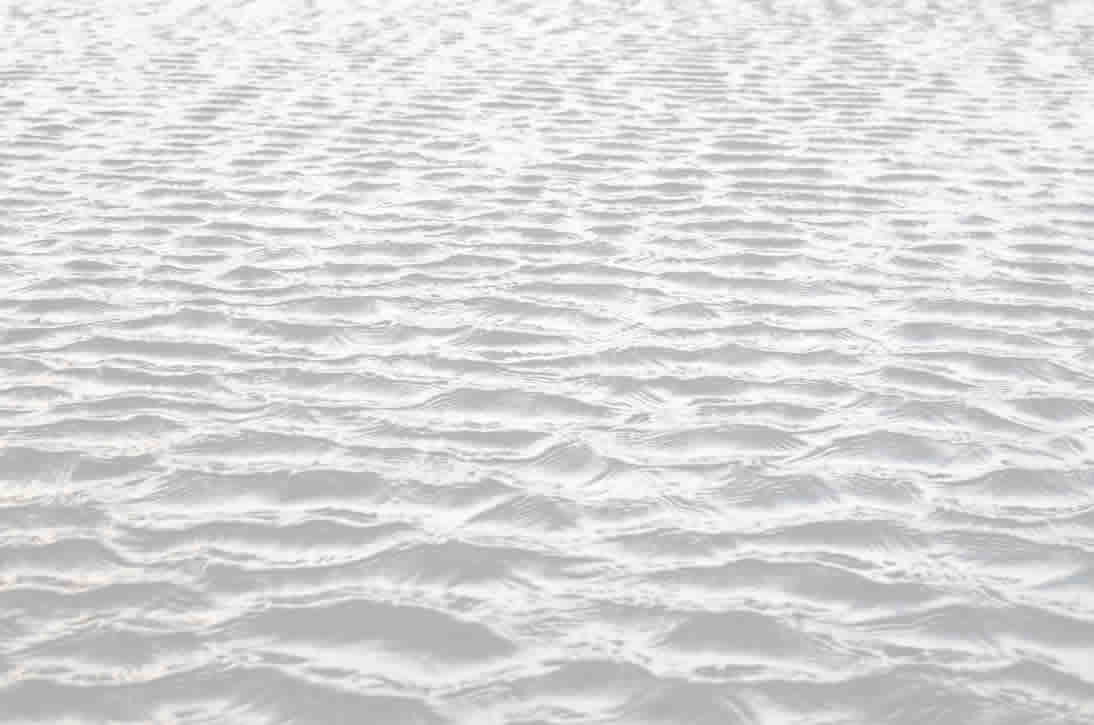

 Two novice veterans from Maidstone are taking on the DW challenge in 2014. Novice in their case means just that. In August 2013 neither Bryn Price or Paul Curtis had ever raced a canoe. The idea was planted by the Kent People's Trust administrator who asked Bryn, the Trust Director and Paul the Honorary Treasurer what silly thing they are going to do next. A visit to Maidstone Canoe Club in August was met with support and trials in a range of boats. They soon became proficient at falling out of even the most stable boats. First race was the Elmbridge Hasler and true to format they fell out in front of the Clubhouse. These two novices do not give up, so they drained the boat and got underway, winning the Div 9 race and beating all the Div 8s.
Two novice veterans from Maidstone are taking on the DW challenge in 2014. Novice in their case means just that. In August 2013 neither Bryn Price or Paul Curtis had ever raced a canoe. The idea was planted by the Kent People's Trust administrator who asked Bryn, the Trust Director and Paul the Honorary Treasurer what silly thing they are going to do next. A visit to Maidstone Canoe Club in August was met with support and trials in a range of boats. They soon became proficient at falling out of even the most stable boats. First race was the Elmbridge Hasler and true to format they fell out in front of the Clubhouse. These two novices do not give up, so they drained the boat and got underway, winning the Div 9 race and beating all the Div 8s.